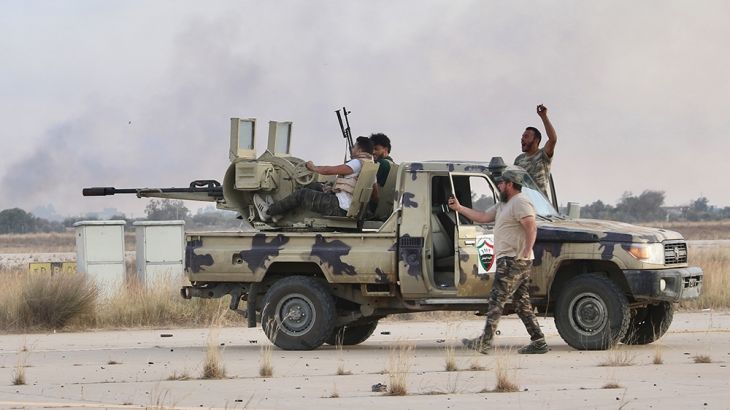Libya’s GNA says it regained full control of the capital, Tripoli
The announcement comes after a year-long siege by forces of eastern-based commander Khalifa Haftar.

Forces fighting for Libya’s internationally recognised government said they regained full control over Tripoli after being besieged for more than a year by militias loyal to an eastern-based renegade commander.
The Government of National Accord (GNA) military operations room said in a statement on Thursday its forces captured all areas surrounding the Tripoli city administrative area.
Keep reading
list of 3 itemsWill setback to Khalifa Haftar change the course of Libya’s war?
Egypt, UAE welcome resumption of Libya ceasefire talks
“Our heroic forces have full control of Greater Tripoli right up to the city limits,” said Mohammed Gnounou, a GNA military spokesman.
A military source with the eastern forces, whose base is in the eastern city of Benghazi, told Reuters news agency they were pulling back from all of Tripoli’s suburbs. No official comment was available from LNA forces.
The withdrawal represents a stinging reversal for eastern commander Khalifa Haftar and his Libyan National Army (LNA), which launched an offensive on Tripoli last year pledging to unite Libya after years of chaos.
The military gains come after a series of battlefield victories against Haftar’s forces in recent weeks.
GNA troops on Wednesday seized Tripoli’s international airport. It has been closed since 2014 and was held by the LNA since last year when Haftar launched his assault on the capital.
|
|
“By taking control of this international airport, GNA forces were able to go beyond and push Haftar’s forces back beyond the administrative borders of the capital,” said Al Jazeera’s correspondent Mahmoud Abdelwahed, reporting from the abandoned facility.
Since 2014, Libya has been split between rival factions based in Tripoli and in the east, in a sometimes chaotic war that has drawn in outside powers and a flood of foreign arms and mercenaries.
Haftar’s LNA, backed by the United Arab Emirates, Egypt and Russia, has been unable to make significant progress since early on in its assault on the capital.
It still controls eastern and southern Libya, including most of the country’s oil facilities and the city of Sirte, at the centre of Libya’s Mediterranean coastline.
Turkey-GNA meeting
The GNA has had Haftar’s forces on the run with the help of Turkish airpower that has turned the tide in the conflict.
Libya’s internationally recognised leader will meet President Recep Tayyip Erdogan in Turkey on Thursday as the allies seek to lock in recent gains on the battlefield near Tripoli ahead of a new round of talks on a potential ceasefire.
Turkey began providing military support to Fayez al-Sarraj’s GNA in November after signing a military cooperation pact alongside a maritime demarcation deal, which gives Ankara exploration rights in the Mediterranean that Greece and others reject.

The Turkish Presidency said Erdogan and al-Sarraj were to meet in Ankara at 11:00 GMT.
On Monday, the United Nations said both sides had agreed to resume ceasefire talks, warning that weapons and fighters flying into Libya in defiance of an arms embargo threatened a major new escalation.
A senior Turkish official said the airport seizure was critical ahead of potential peace talks, and that Turkey would reject any proposal to divide Libya between warring factions.
“Everyone wants to sit at the table without losing territory, but the territory you hold strengthens your positions at the table,” the official said, adding that Erdogan and al-Sarraj would discuss both strategy and the situation on the ground.
Anas El-Gomati, founder of the Tripoli-based Sadeq Institute, said the GNA faces new challenges now that it has repelled Haftar’s forces.
“The GNA is in a better position to begin negotiations,” El-Gomati said.”
But it is also in a much more precarious position because many of its combatants believe in pursuing Haftar to the east of Libya, to his stronghold in the town of al-Rajma… there are many more believe in negotiations so there is going to be a real split within the GNA’s forces.”
|
|
Flurry of diplomacy
Al-Sarraj’s visit to Ankara comes after a flurry of diplomacy on Wednesday as leaders from both sides travelled abroad for meetings hosted by the foreign powers embroiled in the conflict. Al-Sarraj’s deputy and foreign minister travelled to Moscow, while Haftar was in Egypt to meet defence officials.
Ankara, which has sent equipment and military personnel to help the GNA, has slammed Haftar’s supporters for backing a “putschist” and says al-Sarraj’s recent advantage is an opportunity for political talks.
Libya has been without central government authority since 2011, with towns and cities controlled by factions fighting for rival governments in the east and west since 2014.
Establishing a lasting presence in Libya would give Turkey another foothold in the eastern Mediterranean, where it has been at odds with neighbouring states over offshore hydrocarbon drilling.
Greece and Cyprus called last year’s maritime deal with Tripoli illegal, an accusation Ankara has denied.
It would also grant it a strategic position near Egypt, with which ties have been strained for years.
“The whole world recognises that Turkey changed the balance” on the ground, Turkish Foreign Minister Mevlut Cavusoglu said on Wednesday. “We have interests here [and] in the Mediterranean.”